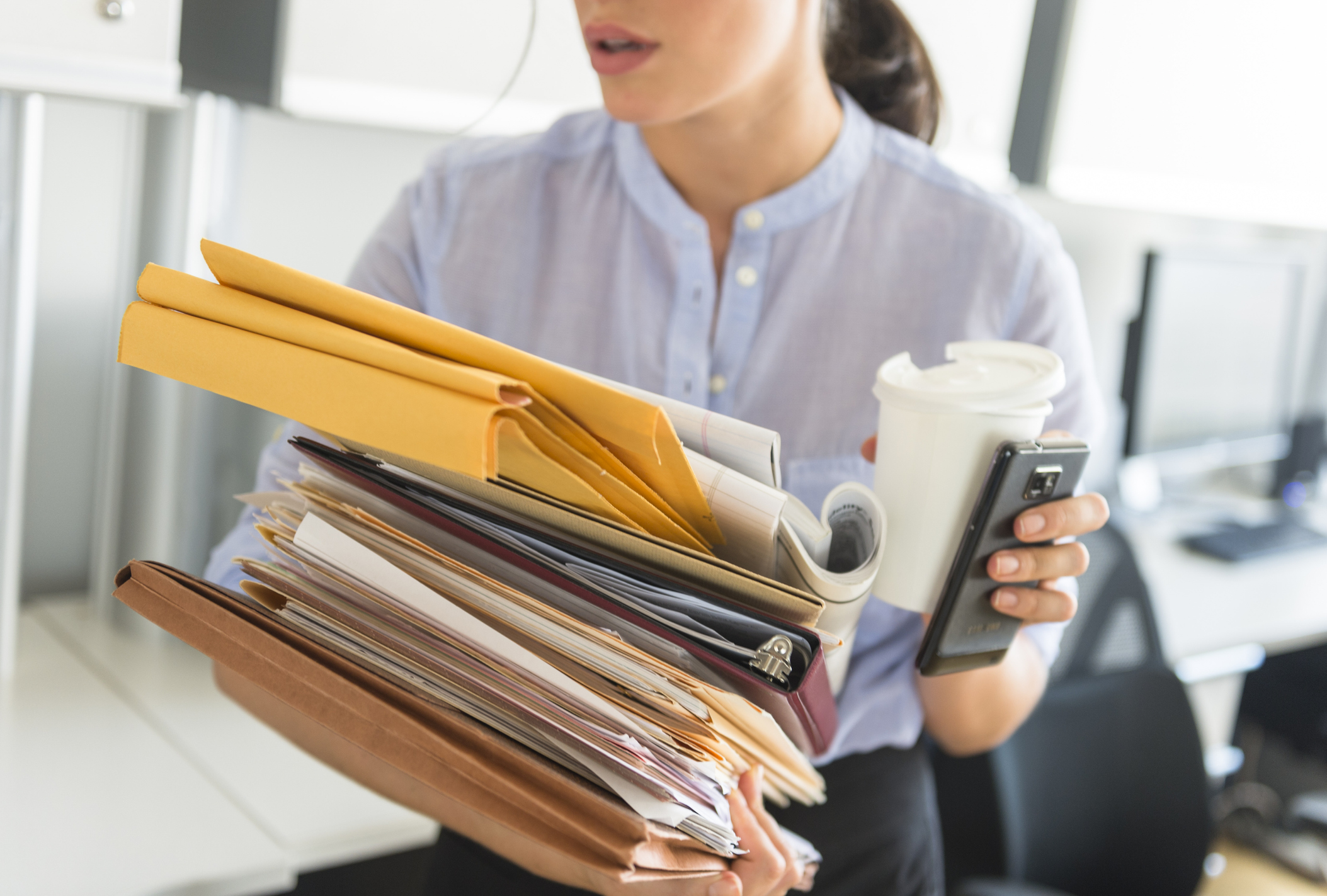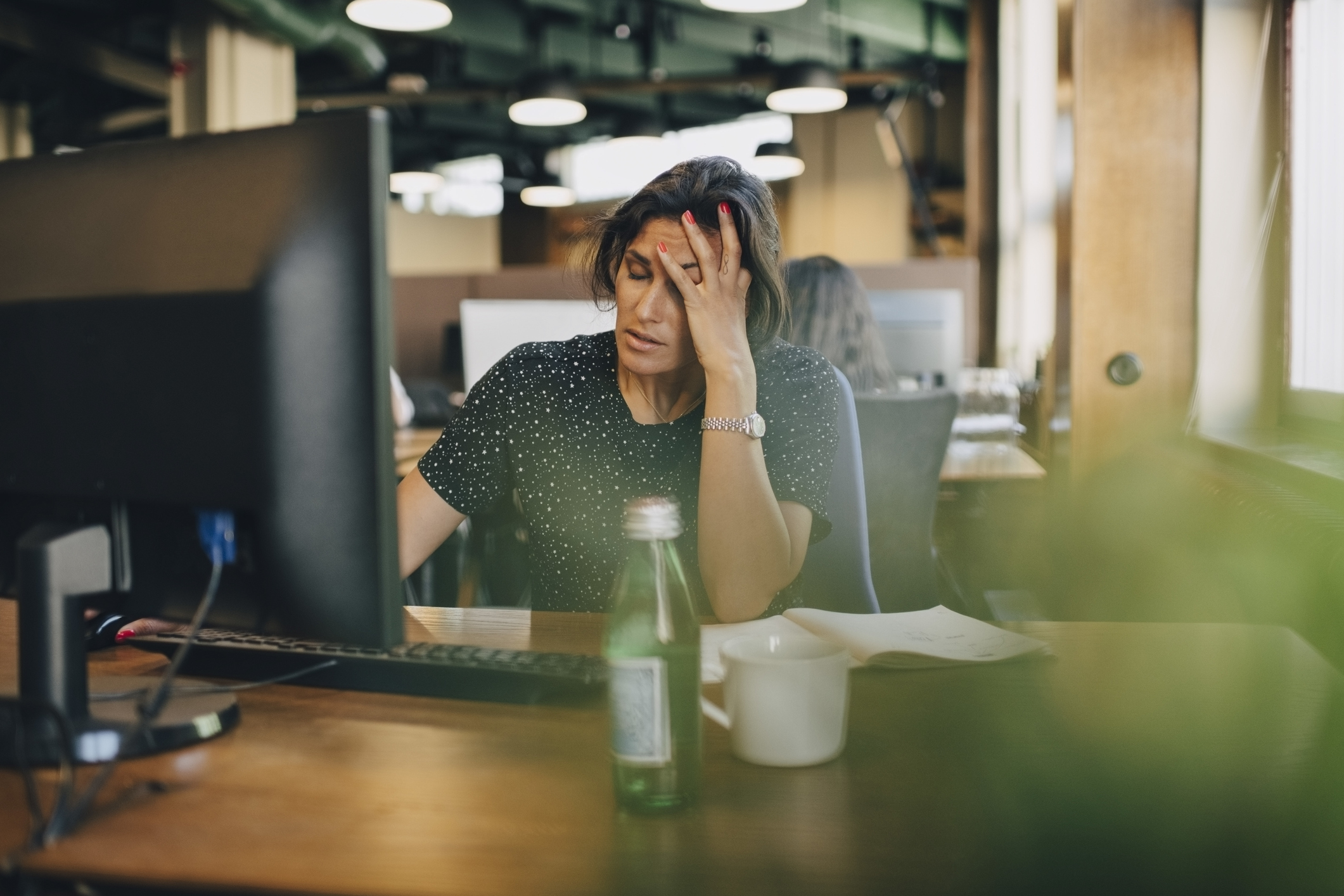
Celebrity news, beauty, fashion advice, and fascinating features, delivered straight to your inbox!
You are now subscribed
Your newsletter sign-up was successful
Knowing how to manage stress at work can feel overwhelming at times. We spend a third of our life at work, yet often face daily challenges, hurdles and obstacles that test the best of us.
Not sure if stress from the workplace is affecting your day-to-day? Good question. If you find yourself frequently thinking about stressful work situations, talking about it at the weekend, and skipping social events to work late, then know it might be time - and further, that it might be time to actively seek help. It might be challenging at first, but if it's impacting your personal life, something needs to change.
Watch out for the tell-tale signs of stress - that is, irritability, low mood, trouble sleeping, racing heart and inability to cope in otherwise manageable situations. Similarly, if you've noticed yourself stress eating, struggling to sleep, or feeling on edge for more than a few weeks, you might be struggling.
That's where learning how to manage stress is important, especially in a professional environment. Here, seven experts reveal their top tips for managing workplace stress - useful, easy-to-implement steps that'll better equip you to cope. Don't miss our round ups of the best stress apps and go-to essential oils for stress, while you're here.
How to manage stress at work: 6 key tips
1. Understand your stress patterns
You've read our guides to chronic stress, catastrophising and stress management techniques - but do you really understand what makes you tick?
To avoid feeling mega anxious about work, first, you need to understand what exactly it is about work that's making you stressed. Whether it's workload or office politics, ultimately, it's not stress that produces burnout, impaired performance, and physical breakdown, but rather the duration of stress without recovery, explains Sascha Heinemann, an expert in performance recovery and stress resilience.
"More often than not, and especially when your stress levels are particularly high, you don't pay much attention to signs such as physical restlessness, wandering attention, and greater irritability. Instead, we override it with coffee, sweets, and other stimulants and deplete our energy reserves with stress hormones like adrenaline and cortisol," he explains.
Celebrity news, beauty, fashion advice, and fascinating features, delivered straight to your inbox!
Sound familiar? Top tip: taking a break every 90 minutes a day will help you to stay both calm and concentrated, ultimately likely lowering your anxiety levels, too.
2. Address your feelings, don't suppress them
Know that to some extent, stress is a normal part of everyday life - as Dr. Lillian Nejad, clinical psychologist and founder of stress app Contain Your Brain points out, stress can even be a positive thing at times, motivating us to stay focused and hit goals.
That said, the key thing to do when feelings of stress arise is to address them. Ask yourself: on a scale of one to ten, how stressed are you about the current situation? And how often do you pretend everything’s fine? "When you suppress what you feel, the stress just gets worse,’ explains self-care coach Dani Dunckley. Instead, she recommends trying to acknowledge what you feel - and then working through it.
She emphasises that it's okay to feel uncomfortable emotions - you don’t need to judge yourself. However, what you do need to do is learnt to work through said emotions. Start by writing out a list of what you can and can’t control. "Let any emotions you have rise to the surface," she advises. "Practice accepting these emotions, and yourself, just as you are—saying things like, ‘I’m angry that I didn’t get a promotion, but that’s okay. I’m allowed to feel angry.’"
When you've let them move through you in their own time, again, you'll likely feel more at peace with your uncomfortable feelings. At the very least, this exercise will help you establish yourself independently of your emotions - an important distinction. Don't miss our guide to figuring out if you're experiencing stress vs anxiety, while you're here.

3. Stop striving for perfection
Think about the last year for a second. It's been stressful, with an ongoing cost of living crisis, the war in Ukraine, and global warming only getting worse. Even if you look forward to work, you may harbour underlying anxiety about the current global issues.
Again, this is normal, according to divorce coach Sandra Wood. She shares that sometimes we take "emotional baggage" to work with us, which sadly makes us more susceptible to higher stress levels both in and out of the workplace.
If you do feel like the last year has been stressful for you personally, Wood has some advice: "This is not the time to strive to be a grade-A student,’ she shares. "Accept that C-level work is good enough for now - know that it’s okay to do the bare minimum at work as you regroup and deal with your immediate needs."
Letting your co-workers, peers or supervisor know that you have experienced a stressful event in your personal life is a good idea, she adds. However, remember your private life is ultimately yours, so you aren't obliged to give full details if you don't want to.
4. Reframe how you respond to crisis
Life is going to throw unexpected and unwanted life events at us - so one way to manage workplace stress is by reframing how you respond to unexpected changes.
“You may put on your game face and venture out pretending everything is fine, but your inner dialogue may tell a different story,” says Elizabeth Carney, professional women’s coach and author of Totally Real.
Carney suggests the following tips to reframe how you respond to a crisis and prevent overwhelm and unnecessary stress:
- Look forwards, not backwards - "To go somewhere new, understand you will never get there if you constantly revisit where you have already been," she shares.
- Know exactly where you want to go - "Even if you have no clue how to get there, stay focussed on the end goal. Your energy really does flow where your attention goes," she explains.
- Appreciate what you do have – it will be more than you realise, Carney reckons.
- Laugh, dance, sing - raise your energy, she advises, and you'll distract yourself from your worries.
Our guide to reframing negative thoughts might come in handy here, too.

5. Try and avoid parental guilt
If you're a parent, it can be easy to fall into the trap of experiencing parental guilt. "As much as we'd like to, the reality is that we can’t split ourselves down the middle," explains Dr Lucy Davey, an entrepreneur and coach for working mothers.
"As parents, we need to make sure we fuel our personal growth as well as that of our family," she continues. "Instead of getting consumed in guilt, consider what the ideal working arrangement would be and discuss this with both your partner and your employer."
Many parents feel they lose their identity by not allowing both sides of themselves to flourish and this in itself can cause stress and conflict, she points out. "Finding the right balance between work and family life means that you’ll be happier, more focused and will feel less guilty about the time you are away from the children."
6. Redefine productivity
Constantly getting distracted at work and seeing your productivity levels suffer, in turn leading to unwanted stress? "The best way to be productive is to forget about productivity altogether," explains Carmel Moore, director of the One Moment Company. "Instead, focus on how you are spending your time and designing your day. Chances are, you've already fallen into the trap of blurring the boundary between work and home," she says.
Moore explains that sometimes we find it hard to judge our own productivity, so often default to working harder. "You manufacture stress to motivate yourself and fuel productivity. But did you know? Longer hours actually make you less productive. One way to alleviate the stress is to redefine what productivity means for you, by knowing when and why you are at your best both at home and at work," she shares.
The Director suggests working out exactly what factors help to make you the best version of yourself. Know when you work at your best - for example, if it's early in the morning, attack your most difficult tasks then.
Make sure your purpose and priorities are clear, and recalibrate if it's not working, she advises.
Knowing how to manage stress at work never looked so easy.

Ally is Marie Claire UK's Senior Health and Sustainability Editor, a well-regarded wellness expert, ten-time marathoner, and Boston Qualifying runner.
Utilising her impressive skillset and exceptional quality of writing, she pens investigative, review and first-person pieces that consistently demonstrate flair and originality.
As well as writing, Ally manages a team of freelancers, oversees all commissioning and strategy for her pillars, and spearheads the brand's annual Women in Sport covers, interviewing and shooting the likes of Mary Earps, Millie Bright, and Ilona Maher. Shortlisted for three BSMEs and winning one in 2022, Ally lives and breathes her verticals: her eye for a story and connections within the wellness sphere are unrivalled. Follow Ally on Instagram for more.
